
Daft Punk were a French electronic music duo formed in 1993 in Paris by Thomas Bangalter and Guy-Manuel de Homem-Christo. They achieved early popularity in the late 1990s as part of the French house movement, combining elements of house music with funk, disco, techno, rock and synth-pop. The duo garnered further acclaim and commercial success and are now regarded as one of the most influential acts in dance music history.

Giovanni Giorgio Moroder is an Italian composer and music producer. Dubbed the "Father of Disco", Moroder is credited with pioneering euro disco and electronic dance music. His work with synthesizers had a large influence on several music genres such as hi-NRG, Italo disco, synth-pop, new wave, house and techno music.
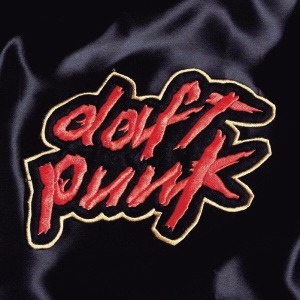
Homework is the debut studio album by the French electronic music duo Daft Punk, released on 20 January 1997 by Virgin Records and Soma Quality Recordings. It was later released in the United States on 25 March 1997. As the duo's first project on a major label, they produced the album's tracks without plans to release them, but after initially considering releasing them as separate singles, they considered the material good enough for an album.
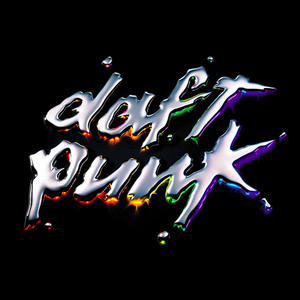
Discovery is the second studio album by the French electronic music duo Daft Punk, released on 12 March 2001 by Virgin Records. It marked a shift from the Chicago house of their first album, Homework (1997), to a house style more heavily inspired by disco, post-disco, garage house, and R&B. Thomas Bangalter of Daft Punk described Discovery as an exploration of song structures, musical forms and childhood nostalgia, compared to the "raw" electronic music of Homework.
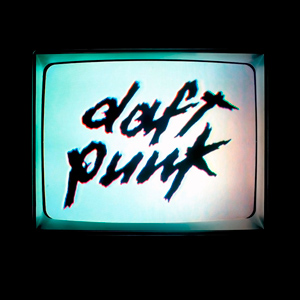
Human After All is the third studio album by French electronic music duo Daft Punk, first released on 14 March 2005 through Virgin Records. Unlike their previous studio album Discovery (2001), whose sound was inspired by disco and garage house and produced over the period of two years, Human After All was more minimalistic and improvisational with a mixture of heavier guitars and electronics, and was produced in six weeks.

Thomas Bangalter is a French musician, record producer, singer, songwriter, DJ and composer. He is best known as one half of the former French house music duo Daft Punk, alongside Guy-Manuel de Homem-Christo. He has recorded and released music as a member of the trio Stardust, the duo Together, as well as a solo artist. Bangalter's work has influenced a wide range of artists in various genres.

"Da Funk" is an instrumental track by French electronic music duo Daft Punk, initially released as a 12-inch single in May 1995 by Soma and Virgin and later included on their debut album, Homework (1997). Prior to its inclusion on the album, "Da Funk" received little attention and was limited to 2,000 copies. The song and its accompanying music video directed by Spike Jonze are considered classics of 1990s house music. It went on to sell 30,000 copies in 1997. A reversed clip of "Da Funk" was also released on Homework as "Funk Ad", which is the final track on the album.

Together was a French house duo consisting of DJ Falcon and one member of Daft Punk, Thomas Bangalter. The duo released two songs, one each in 2000 and 2002, on Bangalter's own record label, Roulé: "Together" and "So Much Love to Give".

Stéphane Quême, known as DJ Falcon, is a French DJ, record producer and photographer. He is the brother of Delphine Quême (Quartet) and a cousin of Alan Braxe.
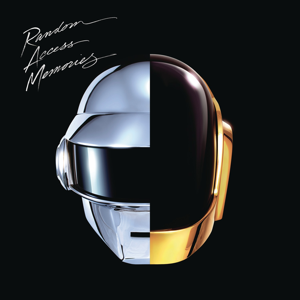
Random Access Memories is the fourth and final studio album by the French electronic duo Daft Punk, released on 17 May 2013 through Columbia Records. It pays tribute to late 1970s and early 1980s American music, particularly from Los Angeles. This theme is reflected in the album's packaging, as well as its promotional campaign, which included billboards, television advertisements and a web series. Recording sessions took place from 2008 to 2012 at Henson, Conway and Capitol Studios in California, Electric Lady Studios in New York City, and Gang Recording Studio in Paris, France.

"Doin' It Right" is a song written and performed by French electronic music duo Daft Punk and American musician Panda Bear of the band Animal Collective. It is a track on Daft Punk's fourth studio album Random Access Memories (2013), and was the last to be recorded for the album. The song was distributed to American alternative radio stations on 3 September 2013 as the third single from Random Access Memories. Prior to this, it appeared on record charts in France, the United States and the United Kingdom due to digital downloads of the album. "Doin' It Right" received a positive critical reception, with some reviewers opining it as the group's best work out of the entire LP.
"Contact" is a song by French electronic music duo Daft Punk. It is the thirteenth and final track from the duo's fourth studio album Random Access Memories, released on 17 May 2013. The track was written and produced by the duo, with additional writing and co-production by DJ Falcon. Daryl Braithwaite, Tony Mitchell, and Garth Porter are also credited as writers due to the song containing a sample of "We Ride Tonight" by Australian rock band The Sherbs. The song includes audio from the Apollo 17 mission, courtesy of NASA and Captain Eugene Cernan. Due to digital downloads of Random Access Memories, the song charted at number 46 on the French Singles Chart and at number 24 on the Billboard Dance/Electronic Songs chart.

"Lose Yourself to Dance" is a song by French electronic music duo Daft Punk and American musician Pharrell Williams. Like their previous collaboration with fellow American musician Nile Rodgers, "Get Lucky", the song was written for Daft Punk's fourth studio album Random Access Memories (2013).
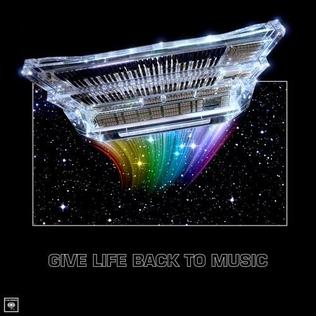
"Give Life Back to Music" is a song written and recorded by French electronic music duo Daft Punk for their fourth studio album, Random Access Memories. It is the opening track on the album. The song features lyrics performed by Daft Punk using vocoders. "Give Life Back to Music" also features album collaborators Nile Rodgers on guitar and Chilly Gonzales on keyboards. The song includes guitar work by Paul Jackson, Jr. and additional keyboards by Chris Caswell, with drums by John "J.R." Robinson and bass by Nathan East. The song was distributed to radio stations on 31 January 2014 as the album's fifth overall single and the final single from the album in 2014. Before this, it charted in France, Sweden, Switzerland, the United States, and the United Kingdom.

Darkside is an American band based in New York City. The band was formed in Providence, Rhode Island in 2011 by electronic musician Nicolás Jaar and multi-instrumentalist Dave Harrington, both of whom were students at Brown University at the time. Their debut studio album, Psychic, was released in 2013 and was followed up by Spiral, released in 2021 after a lengthy hiatus.
"Fragments of Time" is a song by written, produced, and performed by French electronic music duo Daft Punk and American musician Todd Edwards. It is included in the duo's 2013 album Random Access Memories. "Fragments of Time" charted in France and the United States due to digital downloads of the album.

Daft Punk Unchained is an Anglo-French documentary film that was televised on 24 June 2015 in France and on 9 February 2016 in the United Kingdom. It documents the rise to fame and personal lives of Daft Punk members Guy-Manuel de Homem-Christo and Thomas Bangalter and their pioneering influence on electronic music. The film runs chronologically through the artists' early years before their foundation of Daft Punk, up to the release of their 2013 album Random Access Memories and the subsequent Grammy Award that the duo received for it.
"Touch" is a song written and recorded by French electronic music duo Daft Punk and American singer-songwriter Paul Williams. "Touch" serves as the seventh track from the group's fourth studio album, Random Access Memories (2013). The song was featured in the American thriller TV series, Mr. Robot, and Daft Punk's farewell video, "Epilogue".

Random Access Memories is the third compilation album by French electronic duo Daft Punk. It is an anniversary reissue of the duo's final studio album Random Access Memories containing an extra disc with 35 minutes of bonus content, including unreleased demos and outtakes. The reissue was released on 12 May 2023.
















